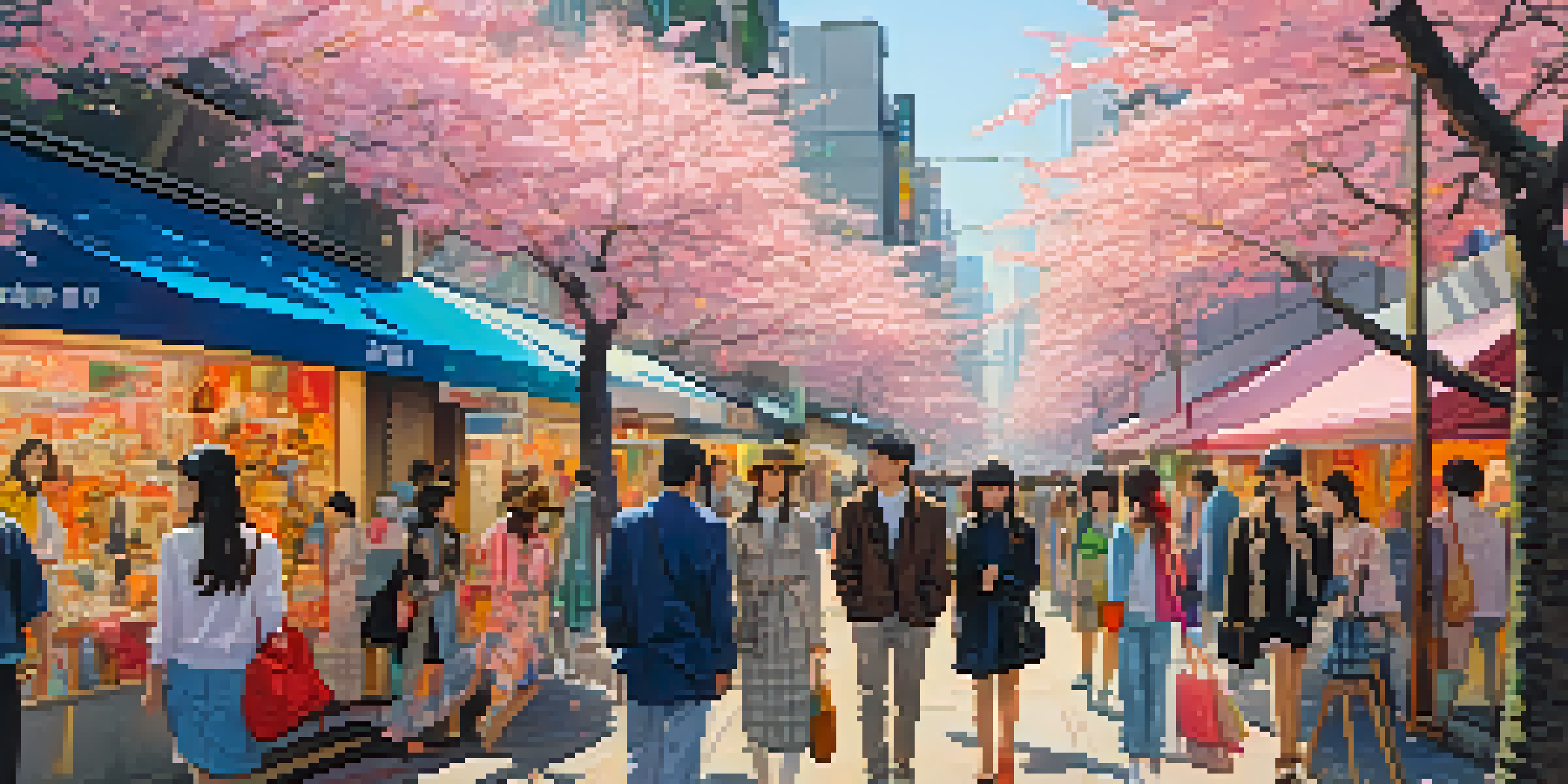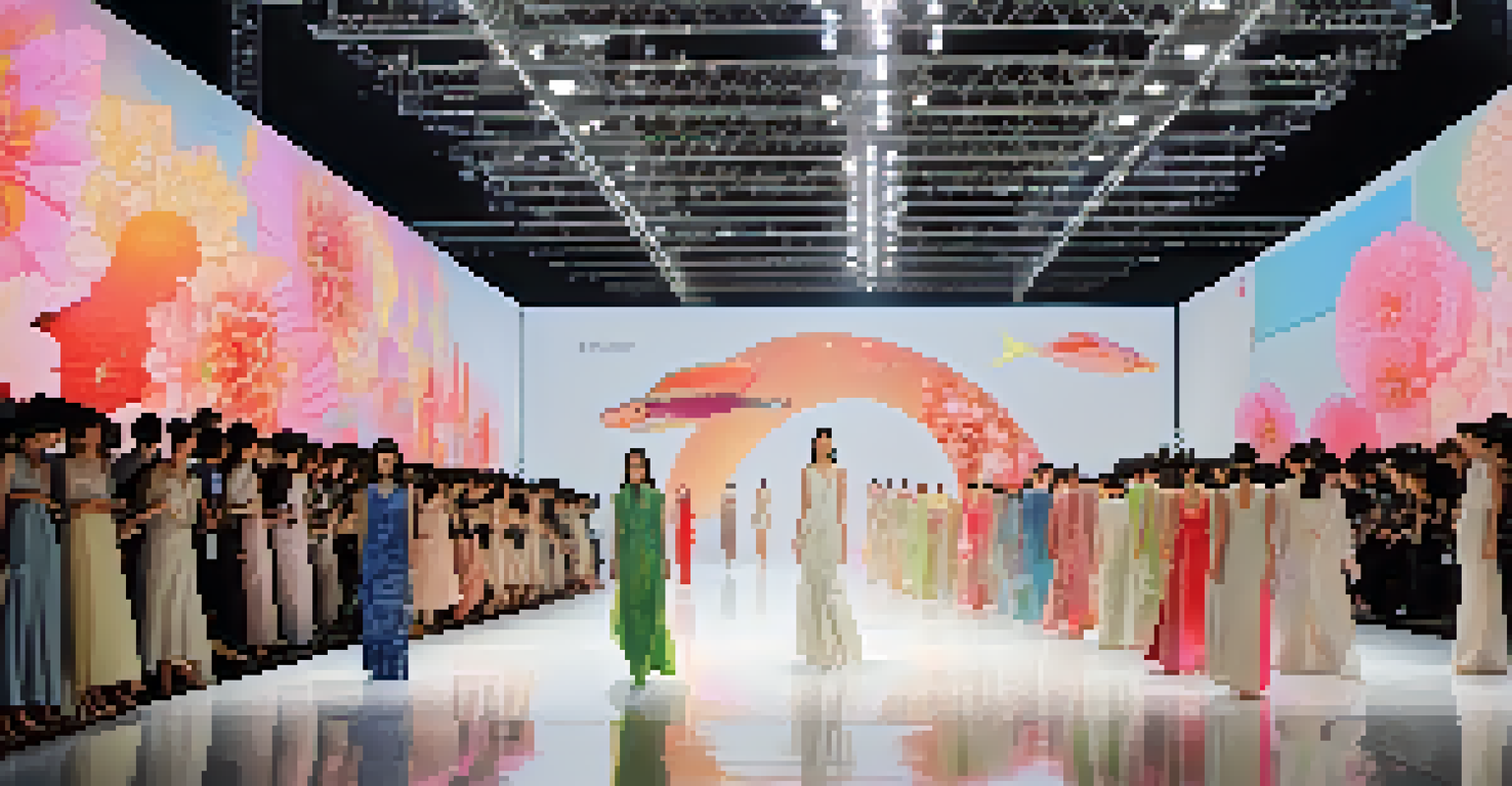Tokyo Fashion Week: A Fusion of Street Style and Elegance

An Overview of Tokyo Fashion Week: A Cultural Phenomenon
Tokyo Fashion Week, held biannually, is more than just a showcase of clothing; it's a vibrant cultural event that merges tradition with modernity. Designers from around the globe flock to this city to present their latest collections, reflecting the ethos of contemporary Japan. Known for its bold and innovative styles, Tokyo Fashion Week attracts fashion enthusiasts, buyers, and influencers alike, creating a melting pot of creativity.
Fashion is the armor to survive the reality of everyday life.
The event spans various venues across the city, each curated to enhance the aesthetic experience. From the bustling Harajuku district, famous for its youth culture, to the upscale streets of Ginza, every corner of Tokyo contributes to the fashion narrative. This setting allows designers to draw inspiration from the city's eclectic mix of traditional and contemporary elements, making each collection a story waiting to be told.
In addition to showcasing established brands, Tokyo Fashion Week provides a platform for emerging talent. Young designers often use this opportunity to break into the competitive fashion industry, bringing fresh perspectives and innovative ideas. This nurturing of new talent is essential for the evolution of fashion, ensuring that Tokyo remains at the forefront of global style.
Street Style: The Heartbeat of Tokyo Fashion
Street style in Tokyo is not just a fashion statement; it’s a lifestyle that reflects individuality and creativity. The streets of districts like Shibuya and Harajuku are alive with fashionistas who blend high-end pieces with thrifted finds, creating unique looks that are entirely their own. This organic fusion of styles is what sets Tokyo apart in the global fashion landscape.

During Fashion Week, street style becomes even more prominent, as attendees showcase their outfits both in and out of the shows. Many photographers and bloggers capture these spontaneous looks, which often go viral online, influencing trends worldwide. The energy of the streets infuses the runway with a sense of authenticity, making each collection feel more relatable and accessible.
Tokyo Fashion Week: A Cultural Hub
Tokyo Fashion Week is a vibrant cultural event that blends traditional and contemporary styles, showcasing global designers and fostering creativity.
The emphasis on personal style allows for experimentation, encouraging individuals to express themselves without fear of judgment. This freedom is essential in a city where conformity is often the norm, making Tokyo a beacon of self-expression in the fashion world. The result is a diverse tapestry of styles that resonates with people far beyond Japan’s borders.
Elegance Redefined: The Runway Experience
While street style reigns supreme outside the venues, inside the shows, elegance takes center stage. Designers showcase meticulously crafted pieces that highlight craftsmanship and attention to detail. The runways transform into artistic platforms where models embody the vision of the designers, often telling a story through their movements and attire.
Style is a way to say who you are without having to speak.
Tokyo Fashion Week is known for its theatrical presentations, with elaborate sets and innovative choreography that elevate the viewing experience. Each show is a carefully curated spectacle, merging fashion with art, technology, and performance. This dedication to creating an immersive atmosphere captivates audiences and leaves them eager for more.
The juxtaposition of street style and elegance creates a dynamic conversation within the fashion community. Designers often draw inspiration from the streets, infusing their collections with a sense of urban sophistication. This blend ensures that elegance is not about exclusivity but rather about celebrating individuality in a refined manner.
Sustainability: A Growing Trend on the Runway
In recent years, sustainability has become a core theme at Tokyo Fashion Week, reflecting a global shift towards eco-conscious practices. Designers are increasingly prioritizing environmentally friendly materials and ethical production methods, showcasing collections that resonate with conscious consumers. This focus on sustainability is not just a trend but a necessary evolution in the fashion industry.
Many brands are now exploring innovative ways to reduce waste, such as upcycling materials and creating timeless pieces that encourage longevity in fashion. This approach not only benefits the environment but also resonates with a younger audience that values social responsibility. By embracing sustainability, Tokyo Fashion Week is setting a precedent for other fashion capitals to follow.
Sustainability Takes Center Stage
The event emphasizes eco-friendly practices and ethical production, reflecting a growing commitment to sustainability in the fashion industry.
Moreover, the emphasis on sustainability fosters a sense of community among designers and consumers alike. It encourages collaboration, sparking discussions about the future of fashion and the role each individual plays in it. This collective movement towards a greener future is an exciting development within the industry, showcasing that style and substance can indeed coexist.
The Influence of Technology on Fashion Trends
Tokyo is renowned for its technological advancements, and this influence extends into the realm of fashion as well. Designers are increasingly incorporating technology into their collections, from smart textiles to augmented reality presentations. This innovative edge not only enhances the visual appeal of the shows but also opens up new avenues for creativity and expression.
During Tokyo Fashion Week, we often see collections that feature interactive elements, allowing attendees to engage with the designs in unique ways. For instance, some designers have experimented with 3D printing, creating one-of-a-kind pieces that challenge traditional manufacturing methods. This fusion of fashion and technology not only excites the audience but also pushes the boundaries of what fashion can be.
Furthermore, social media plays a significant role in shaping trends and amplifying voices within the fashion community. With platforms like Instagram and TikTok, styles showcased during Fashion Week can go viral within minutes, reaching a global audience. This rapid dissemination of trends highlights the importance of technology in modern fashion, creating a dynamic interplay between the runway and the streets.
Cultural Influences: Honoring Tradition in Modern Fashion
Tokyo Fashion Week beautifully encapsulates the balance between honoring tradition and embracing modern influences. Many designers draw inspiration from Japan's rich cultural heritage, incorporating traditional fabrics, techniques, and motifs into contemporary designs. This homage to the past adds depth to the collections, creating a narrative that resonates with both local and international audiences.
For instance, you might see kimono-inspired silhouettes paired with modern accessories, creating a dialogue between heritage and innovation. This fusion allows fashion enthusiasts to appreciate the craftsmanship of traditional garments while still feeling relevant in today’s fast-paced world. It serves as a reminder that fashion is an ever-evolving art form, deeply rooted in culture.
Technology Shapes Fashion Trends
Innovative technologies, including smart textiles and social media, are redefining fashion trends and enhancing the overall experience of Tokyo Fashion Week.
As designers continue to explore their cultural identities, Tokyo Fashion Week becomes a platform for celebrating diversity and storytelling. Each collection offers a glimpse into the designer's perspective, inviting viewers to explore the intersection of tradition and modernity. This cultural richness not only enhances the fashion landscape but also fosters a sense of global community.
The Future of Tokyo Fashion Week: What Lies Ahead?
As Tokyo Fashion Week continues to evolve, its future looks promising, marked by innovation and inclusivity. The event is expected to embrace more diverse voices, showcasing designers from various backgrounds and perspectives. This expansion not only enriches the fashion narrative but also reflects the changing dynamics of the industry as a whole.
In addition, the integration of technology is likely to deepen, with virtual and hybrid shows becoming more commonplace. This shift allows for greater accessibility, enabling fashion enthusiasts worldwide to experience the magic of Tokyo Fashion Week from the comfort of their homes. It opens up opportunities for designers to reach a broader audience and connect with fans across the globe.

Ultimately, the future of Tokyo Fashion Week lies in its ability to adapt and respond to the ever-changing landscape of fashion. By continuing to fuse street style with elegance, sustainability with innovation, and tradition with modernity, it will undoubtedly remain a pivotal event in the global fashion calendar, inspiring generations to come.